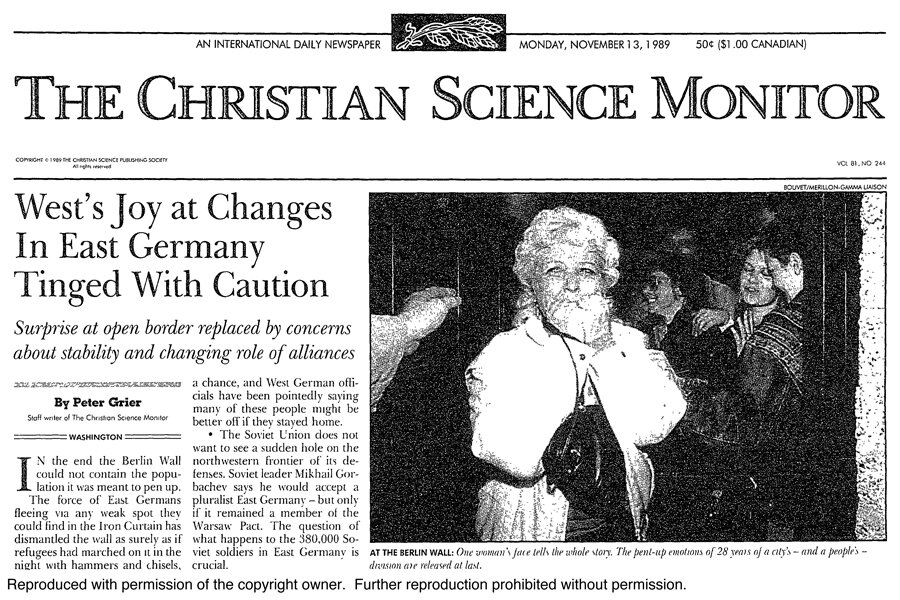From the Monitor archives: Joy in Berlin as the Wall falls
Loading...
This article originally appeared in the Nov. 13, 1989, edition of The Christian Science Monitor.
Euphoric East Berliners Stream Past Open Wall
As the celebration goes on, Krenz announces radical reforms
EAST BERLIN – "Today the German people are the happiest people in the world,” declared West Berlin Mayor Walter Momper. None of the half million visitors to Berlin this weekend would disagree.
This city has been swept along in a tidal wave of euphoria ever since last Thursday’s announcement of new travel freedoms by the East German government. At a rate estimated by police as reaching tens of thousands an hour, East Germans are streaming into Berlin. Most are coming for a day or two. Border guards merely glance at identity papers and wave the East German citizens through checkpoints in the Berlin Wall.
Thousands of people climbed onto the wall in front of the Brandenburg gate. They stayed there all day Friday. Pieces of the wall were broken off by hammers and pick-axes by crowds chanting, “The wall must go!”
Their efforts were more symbolic than effective. The largest holes in the wall were made by the East Germans themselves. Starting at just after midnight Saturday morning, East German construction crews with cranes removed huge concrete slabs for the first of nine new border crossings into West Berlin.
On both sides of the wall, everyone wanted to help. Once crossing into West Berlin, East Germans were greeted by cheering crowds all weekend long. But the greetings didn’t end there. West German government policy is to give any visiting East German 100 deutche marks (US$54) as “welcoming money.” The money is handed out at any bank or post office. On Saturday, banks were opened just to hand out money to East Germans.
Stores, usually only open until early afternoon on Saturday, stayed open until early evening. Berlin became a huge shopping mall, with car traffic excluded from all of the Kurfurstendamm and from most of downtown.
But an East German visitor had plenty of opportunities not to spend money too. Near one checkpoint, a local supermarket had installed trailer trucks and were handing out free bags of coffee, chocolate, juice cartons, and milk. City transportation was free to all East Germans. Most telephone booths near train stations and border crossing points had been adjusted to allow free telephone service for any visitor that wanted to call friends or family in West Germany.
Some stores were accepting East German marks in payment at a 1 to 1 exchange rate. A telephone bank was set up for people offering beds or temporary accommodations to East Germans.
In Berlin, many of the visitors from the East had driven from as far away as Dresden. One family from Jena was heading back east at the end of the day Saturday. Two children slept despite the noisy crowd at the checkpoint. Asked how they enjoyed their visit, the couple said, “It was unbelievable, wonderful,” and then with a look toward the children, “but a little strenuous. We hope to come back next weekend.”
The political response to the rapid change was just as historic as the size of the crowds. On Friday evening Chancellor Helmut Kohl, former Chancellor Willy Brandt, and Foreign Minister Hans Dietrich-Genscher addressed a huge group at the Schoneberger City Hall in Berlin.
“It is certain that nothing can remain as it was in either part of Germany,” Willy Brandt said.
At the same time, on the other side of the wall in East Berlin near Alexanderplatz, Communist Party Chief Egon Krenz addressed a rally of nearly 100,000 party members. Sounding more like the schoolteacher he once was, Mr. Krenz told the crowd of mostly middle-aged party functionaries that the changes were here to stay. In reference to opposition criticism of party privileges, he said, “Our privilege as party members is the privilege to work, and that is the only privilege.”
At the end of a three-day Central Committee meeting Friday, Krenz announced radical reforms. They included free elections, a “socialist planned economy oriented to market conditions,” separation of party and state, freedom of assembly, changes in press law, and parliamentary supervision of state security.
North of where Krenz spoke, members of the opposition group New Forum met at the Gethsamene Church. Barbel Bohley, Rolf Heinrich, and a large panel of other leaders made small speeches and answered written questions. The crowd in the church was loud, but far less numerous than previous New Forum meetings in the same space.
A representative of New Forum was applauded loudly when he jokingly suggested that considering the dizzying pace of change, it might not be unrealistic to expect the Communist Party to step down in three or four days. He then went on to caution people against thinking that the travel freedoms and plans for free and secret elections were enough.
“The SED [The Socialist Unity Party of Germany, which ruled East Germany] still controls the government, they have over 2 million party members and an Army,” explained the representative, referring to the Communist Party. “We have, as of last week, 200,000 members and have existed for only two months or so.”
The tone was jubilant but Krenz’s plans for free elections would keep them waiting until 1991. The opposition and the West German government is calling for a rerun of last May’s election results.
In a weekend of incredible changes, more are awaited. The next are expected Monday, when the East German People’s Chamber meets to elect new Cabinet members and approve laws suggested last week. And Kohl and Krenz indicated plans to meet somewhere near East Berlin before the end of the year.







